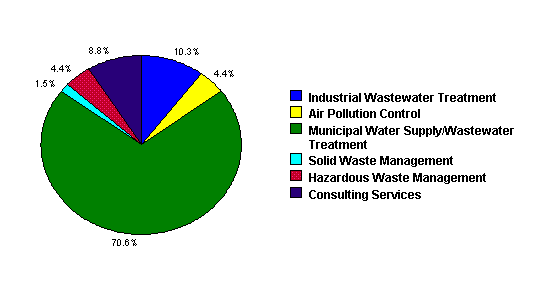Environmental Technologies Industries
 |
Environmental Technologies Industries
 |
| Egypt Environmental Export Market Plan |
Executive Summary
|
 |
 |
 |
Egypt represents a significant and growing market for export of U.S. environmental technology and consulting services. The Government of Egypt (GOE) has recently taken important steps to strengthen its legal and institutional framework for environmental management. The country is acting in response to the potential health impacts of urban and industrial water and air pollution and unsafely managed hazardous and solid waste. Law 4 of 1994 created a new Egyptian Environmental Affairs Agency and established standards, monitoring and record-keeping requirements, and enforcement mechanisms with respect to air pollution and hazardous and solid waste management. Water pollution is regulated by earlier laws and government decrees. Law 4 also requires environmental impact assessments (EIAs) for new and expanding projects.
The overall environmental technologies and services market was estimated at $680 million for 1998. Most of the funding in Egypt's environmental market comes from international donors. Contribution by the U.S. Agency for International Development (USAID) is the largest by far, which helps U.S. firms dominate the market. However, U.S. companies face stiff competition from British, French, and German firms in particular market sectors. The graph below breaks down the Egyptian environmental market by sector.
Egypt's Environmental Market Estimate (1998)
Total = 680 million ($US)

Source: Hagler Bailly, 1998.
Municipal water supply and wastewater treatment constitutes the largest ($480 million) and fastest growing market segment, with the best opportunities for U.S. companies. Egypt is one of the largest water-pump markets in the world. Total USAID funding for ongoing water and wastewater infrastructure projects exceeds $1.1 billion.
Another strong market ($60 million) is environmental consulting, including providing EIAs, pollution prevention audits, policy development, and institutional strengthening. The demand for environmental services is growing. Over 80 percent of this market segment is supported by USAID and other international donor-funded technical assistance projects.
The markets for industrial wastewater treatment, air pollution control, and hazardous waste management are still relatively small but are expanding as the GOE strengthens the enforcement of environmental standards for industry. In response to this regulatory pressure, industrial companies, especially private export-oriented firms in new industrial cities, are increasingly eager to adopt pollution control and prevention options to satisfy environmental requirements of overseas buyers and the GOE.
Egypt's environmental market is becoming more and more attractive to foreign investors and exporters. Business conditions have substantially improved over the last decade. As part of its Economic Reform and Structural Adjustment Program, Egypt is liberalizing its trade regime, encouraging private-sector growth, and improving the investment climate. The GOE is working to overcome widespread bureaucratic practices that remain a key business impediment. The U.S.-Egyptian Partnership for Economic Growth and Development functions as a mechanism to promote stability and prosperity in Egypt. The fact that the United States is the biggest donor in Egypt creates a favorable environment for the activities of U.S. businesses there.
Contact
Us
About ITA
ITA Site Map
Privacy Statement
U.S.Department
of Commerce International
Trade Administration